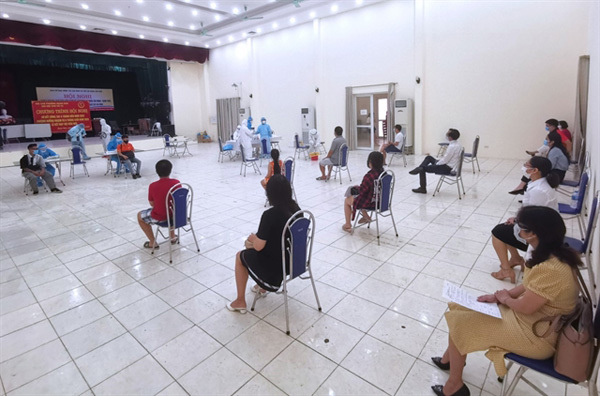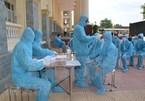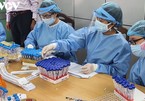 |
| Residents in Cau Giay District, Hanoi who visited Da Nang between July 15 and 29, wait for their turns for COVID-19 testing on Tuesday. The city will continue to give the tests to more than 50,000 returnees from Da Nang. — VNA/VNS Photo Thanh Dat |
Speaking at a meeting of the National Steering Committee on COVID-19 Prevention and Control on Monday, Long cited northern Hai Duong City as a hotspot of community transmission with 11 cases confirmed so far, all linked to a restaurant on Ngo Quyen Street.
“The infection source started from the restaurant in late July. The coronavirus strain detected in Hai Duong is similar to the SARS-CoV-2 in central Da Nang City. There will be more new locally-transmitted cases in Hai Duong in the coming days,” he said.
About 800 people linked to Hai Duong were identified as having direct contact with positive cases and as many as 2,000 people in the city have been tested tests. The city will also test people who had direct contact with positive cases.
Long asked the city to test people in high-risk areas as well as medical workers, patients at hospitals and clinics, focusing on tracing, zoning off and taking samples as quickly as possible.
With 11 cases linked to Da Nang, Hanoi has given PCR tests to more than 28,000 returnees from the central city and will continue to conduct the tests on a wider scale.
Long said the hotspots in Da Nang City and Quang Nam Province were expected to be contained in late August. The daily number of new cases detected in those areas had reduced from 20 cases between August 3 and 8 to 10 cases from August 10 to 17.
Experts had issued high-level warnings for community transmission but in many places, people hadn't strictly followed pandemic prevention regulations, he said, urging drastic measures to slow the transmission rate and limit infection sources.
As Vietnam was facing COVID-19 community transmission risks, medical experts at the meeting proposed increasing the pandemic alert level, especially in urban areas and densely-populated places.
The ministry also urged people to download the Bluezone app to quickly and accurately detect people likely to be COVID-19 patients and declare their health status on the NCOVI app.
Vaccine
The Ministry of Health announced at the meeting the authority had ordered vaccines created by Russia, which would have to follow Vietnamese vaccine testing procedures for use in the country.
“The imported vaccine, before being used in Vietnam, does not need testing on animals but needs clinical trials on humans to ensure its safety. This process will take six months to several years before the vaccine is widely applied,” said Associate Professor Tran Dac Phu, a senior advisor of the Public Health Emergency Operations Centre.
Medical experts highlighted that before vaccines or effective treatment, people must stay vigilant and safely cohabit with the pandemic.
According to Long, since July 25, Vietnam conducted more than 342,000 Realtime RT-PCR tests. Testing capacity at health care facilities has increased by 10 to 40 per cent.
The health ministry ordered central-level hospitals to set up laboratories with high testing capacity to assist localities.
The Steering Committee and the health ministry agreed not to permit paid COVID-19 testing services. Health care facilities which violate the regulation will be penalised. VNS

Seven more Covid-19 cases confirmed, one in Hanoi
This morning the Ministry of Health announced that seven new cases were diagnosed with Covid-19, including 6 community infections and one returnee from the Philippines, bringing the infection tally to 983.

Two more Covid-19 cases reported in Vietnam, totalling 964
Two more locally-transmitted coronavirus cases have been confirmed in Hai Duong and Quang Nam during the past 12 hours, bringing Vietnam’s tally of COVID-19 infections to 964.